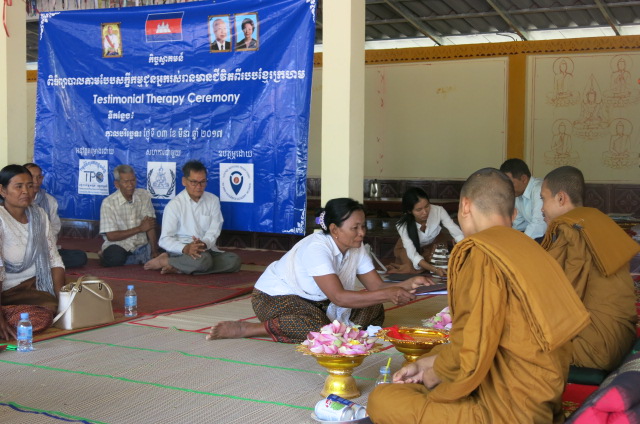I sat under the pagoda, moved by the monks’ chanting, which was accompanied by a chorus of over forty attendees. The incantations concluded the Testimonial Therapy ceremony and the four participants rose from their seated position, with therapists by their sides. Behind the pagoda, a monument stood, housing the skulls of those who died in the commune’s own killing field.

The Testimonial Therapy ceremony took place in Takeo province and was organized by the Transcultural Psychosocial Organization (TPO). The four participants are Civil Parties to Case 002, who had been selected by to take part in this therapy.
Testimonial Therapy is used in Cambodia to help victims of the Khmer Rouge restore their dignity through the public acknowledgment of their suffering. With the support of a therapist, the individuals’ traumatic experiences are put into writing and a formal testimony is produced. This testimony is then publically delivered during the ceremony and presented to a monk. The monk blesses the participant and the story is then “given back” to the survivor, to use as he or she wishes. It is a ritual with empowering and spiritual effects.
Vathana Hoy, of TPO, explained that the ceremony is preceded by a four-day therapy process. During these four days, coping skills are taught to help the survivors deal with emotional breakdowns. It is a short-term treatment that has been shown to help reduce symptoms of post-traumatic stress disorder (PTSD) that are often experienced by survivors of the Khmer Rouge.
“Many Civil Parties have never talked to other people in details like this, only family” explained Vathana.
In cases of trauma, silence can result in further negative feelings. Through truth-telling, traumatic memories are restored. Testimonial therapy helps in healing, closure, and dignity for victims. It promotes the acknowledgement of suffering, a crucial element in the healing process. As well, it is believed to help ease the spirits of ancestors and deceased relatives.
The role of Civil Parties at the Extraordinary Chambers in the Courts of Cambodia (ECCC) is historic. Case 001 against Kaing Guek Eav, alias Duch, was the first case in an international tribunal in which surviving victims of alleged crimes could participate directly. The participating victims, referred to as Civil Parties, take part in the criminal proceedings.
The participatory mechanism of testimony provided a limited number of Civil Parties the ability to testify in court. This official setting, often in the presence of the accused, has been considered a therapeutic event for many. In a study of PTSD and the Khmer Rouge Tribunal, Sonis et al found that Civil Parties overwhelmingly rated their testifying experience as positive. Unfortunately, not all Civil Parties are granted the opportunity to testify in this judicial setting.
The work of TPO is important in the process of reconciliation and truth telling, granting more people the chance to heal through testimony. The benefits of testimonial therapy are beyond the individual, helping families and communities to heal. Vathana explained that many of the people who attended the ceremony had experienced similar suffering, and bearing witness to the event may empower them to share their own stories.
Testimony, both inside and outside the courtroom, can be a powerful and important tool for healing.